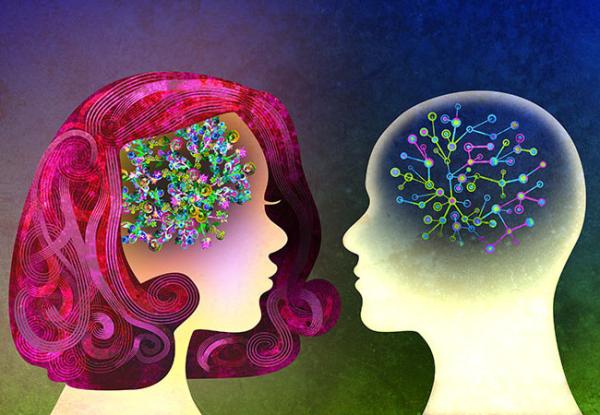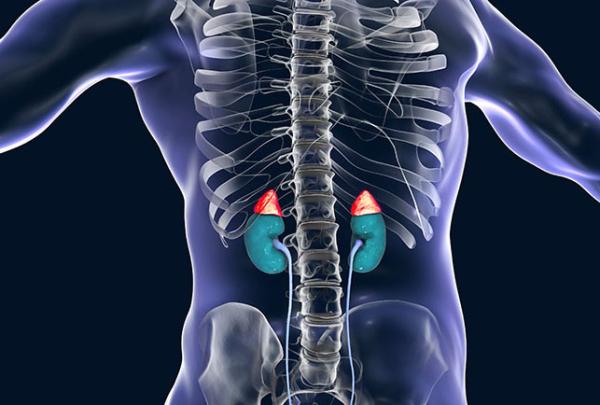Gender Differences in Emotional Responses May Start in the Womb
Research Suggests Hormonal Exposures In-Utero Influence Mental Health

A recent IRP study suggests that exposure to certain hormones in-utero may influence the developing brain in ways that contribute to differences in how men and women respond to stressful events.
Over the past few decades, broad stereotypes about how men and women behave have given way to a more nuanced understanding of the many factors that contribute to sex differences. While culture and environment undoubtedly play a huge role, it’s becoming increasingly clear that biological influences shape male and female brains differently starting at the very beginning of life. Recent IRP research sheds additional light on this age-old question by revealing that women exposed to higher levels of certain hormones in-utero had emotional responses to the stresses of the COVID-19 pandemic that more closely matched those of men.1
The many difficulties that COVID-19 brought to our lives did not affect everyone equally. Multiple studies have found that the pandemic harmed women’s mental health more than men’s — findings that aren’t too surprising given that women are roughly twice as likely to develop depression or an anxiety disorder at some point in their lives.
“In general, women suffer from more anxiety, and that was true during the COVID pandemic too, when there was a mental health crisis in this country,” says IRP senior investigator Deborah Merke, M.D., the new study’s senior author.
Along with IRP staff clinician Monique Ernst, M.D., Ph.D., the study’s first author, Dr. Merke took advantage of that once-in-a-lifetime event to probe the biological origins of sex differences in emotional responses. The study also leveraged Dr. Merke’s long history of working with people who have congenital adrenal hyperplasia (CAH), a genetic condition that causes a developing fetus to be exposed to higher-than-normal levels of sex hormones called androgens, which play a crucial role in producing male sexual characteristics.

Androgens are produced by the adrenal glands, twin organs that sit on top of the kidneys and produce a variety of hormones.
Though doctors typically diagnose CAH soon after birth and quickly normalize hormone levels with medication, the higher levels of androgens a baby with the condition has while growing in the womb may still have consequences later on. The effects would be particularly evident in women with CAH, since it’s normal for male fetuses to have high levels of androgens.
“How to prove that gender differences are partially hormonal is pretty complicated,” Dr. Merke says. “That’s why our study was so interesting: we’re using a group of patients with a rare genetic disorder that have imbalances in sex hormones.”
To investigate how androgen hormones contribute to gender differences in emotional experiences, Dr. Merke and Dr. Ernst compared how 60 individuals with CAH and 240 people without the condition answered survey questions about their levels of emotional distress and anxiety during the first year of the COVID-19 pandemic. The two groups were matched so that factors like socioeconomic status, age, marital status, and the type of area they live in — rural, urban, or suburban — did not differ significantly between the two groups. Even so, the prevalence of anxiety disorders was higher in the non-CAH group than in the CAH group, hinting right off the bat that CAH might influence how people handle emotionally trying circumstances.
What’s more, men with and without CAH reported the same amount of anxiety and emotional distress during that period, but women with CAH reported significantly less of those emotional difficulties than women without CAH. As a result, among the participants without CAH, women reported significantly more anxiety and distress than men, but there was no such sex difference in the group with CAH. These results suggest that the high amounts of androgens women with CAH are exposed to in-utero may change their responses to emotional events for the rest of their lives — specifically, by making them more similar to those of men.
“The response to a stressor seems to be dampened in women with CAH compared to women without CAH, but there’s no difference in males,” says Dr. Ernst. “It’s not necessarily a disorder, it’s just a heightened sensitivity in women without CAH — more of a temperament difference — but it may increase the ability of these responses to become excessive.”

Dr. Deborah Merke (left) and Dr. Monique Ernst (right) led the new study.
“There are androgen receptors on key brain structures in the network that governs emotional processes, so there may be some dampening of the response of this network in CAH,” she adds. “I think that androgens are setting up the brain in-utero to respond in a certain way. It’s a critical period for the effects of hormones on brain function.”
While it’s not currently possible to adjust the levels of hormones someone is exposed to in the womb, learning about how hormone levels influence the developing brain, and the later consequences of those effects on mental health, could give scientists useful clues about how to create new treatments for depression and anxiety disorders. In particular, if additional studies support the idea that androgen levels in-utero influence gender differences in mental health later in life, scientists might enable the creation of new medications for anxiety by teasing out the molecular mechanisms underlying that relationship.
“I think it’s a good proof-of-concept study,” Dr. Merke says. “It’s the kind of study that stimulates other ideas, and it’s really interesting to take advantage of a unique population like people with CAH, since you couldn’t do a clinical trial and give fetuses androgens in-utero. It’s a thought-provoking study with interesting results that, hopefully, people doing research in the area of anxiety will find helpful in addressing their research questions.”
Subscribe to our weekly newsletter to stay up-to-date on the latest breakthroughs in the NIH Intramural Research Program.
References:
[1] Ernst M, Cogo-Moreira H, Desai J, Merke DP. Sexual dimorphism in anxiety is programmed in-utero by sex-steroids: Proof of concept using a disease-model and stress responses to COVID pandemic. Psychiatry Res. 2024 Jan;331:115623. doi: 10.1016/j.psychres.2023.115623.
Related Blog Posts
This page was last updated on Tuesday, April 2, 2024
